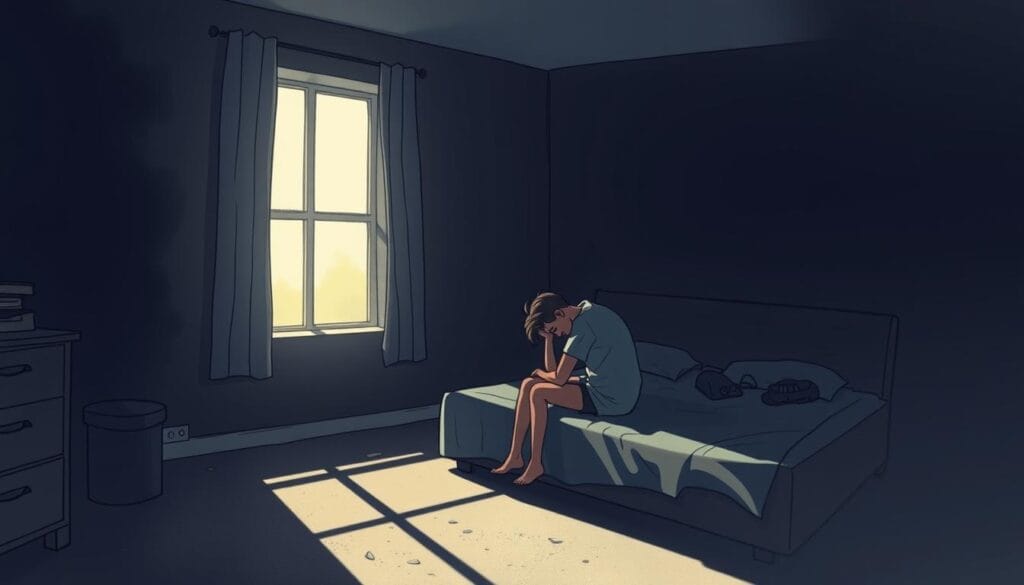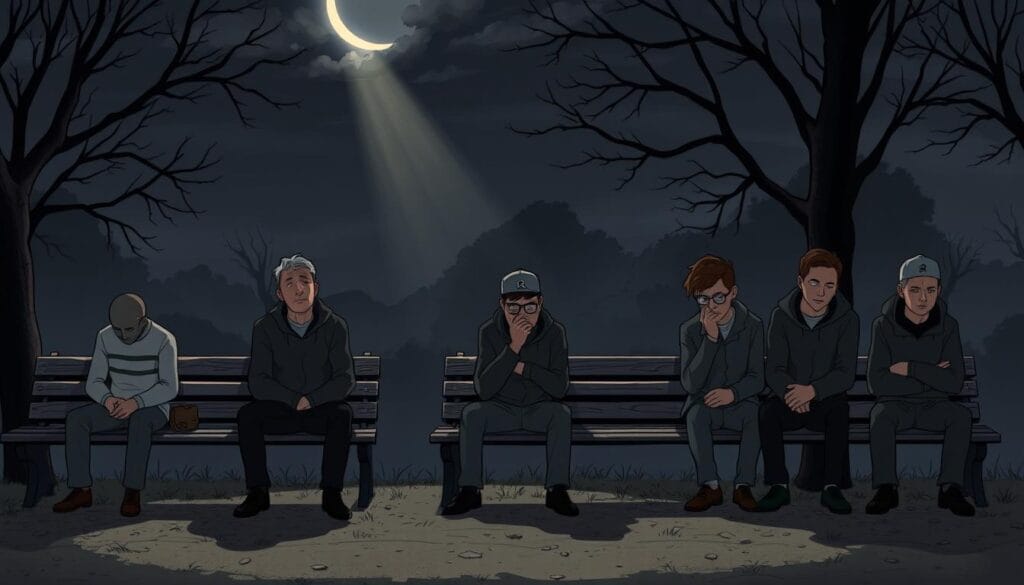Depression is a serious mental health issue that affects both men and women. But, depression in men often goes unnoticed and untreated. This is because of stigma and societal expectations. Dr. Chandril Chugh, an expert on men’s mental health, sheds light on the unique symptoms of male depression. He also talks about the risk factors and how to get professional help for depression in men.
It’s believed that depression affects 1 in 8 men at some point. Yet, men are less likely to get diagnosed than women. This is because many think depression is a “women’s issue.” Also, there’s pressure on men to seem strong and in control.
Many men with depression in men suffer in silence. They don’t know about the help available to them. Understanding the signs of depression in men and the challenges they face is key. This helps us fight stigma and encourages men to seek help for depression in men.
With the right support and treatment, men can beat depression. They can then regain their mental health and wellbeing.
Table of Contents
ToggleUnderstanding Depression in Men
Depression is not just a women’s issue. It affects men too. About 1 in 10 men will deal with depression at some point. But, many men don’t get help because of the stigma and the idea that men should be tough.
Prevalence of Depression in Men
Depression in men is often ignored. But, the facts are clear. Depression hits 1 in 8 men at some time. Also, 7 men die by suicide every day in Australia, showing how urgent this problem is.
Stigma and Barriers to Seeking Help
Many men don’t want to talk about their depression. They worry they’ll be seen as weak. This fear stops them from getting help. They might talk about feeling tired or losing weight instead of their emotional pain.
We need to break down these barriers. We must tackle the stigma around men’s mental health. By understanding depression in men and their challenges, we can help create a supportive space for them.
Symptoms of Depression in Men
Depression shows up differently in men than in women. Women often feel sad and worthless. But men might feel tired, have pain, or change how they act. It’s important to know how depression looks in men to help them.
Physical Symptoms
Men with depression might first show physical signs. These can be:
- Fatigue and low energy
- Insomnia or sleeping too much
- Unexplained aches and pains
- Changes in appetite, leading to weight loss or gain
Emotional Symptoms
Depression in men can look different from sadness. Men might feel:
- Irritability, restlessness, and agitation
- Withdrawal from social activities and relationships
- Increased risk-taking behaviors, such as substance abuse
- Difficulty concentrating and making decisions
It’s key to spot these signs of depression in men. This way, we can get them the help they need. Understanding depression in men helps us support them better.

Risk Factors for Depression in Men
Depression can hit anyone, but some things might make men more likely to get it. Knowing these risk factors helps spot depression in men early.
Job loss or being unemployed is a big risk. Money worries and uncertainty can hurt a man’s mind, causing him to feel worthless and hopeless. Problems in relationships, whether with a partner or family, can also lead to depression in men.
- Chronic health issues like diabetes, heart disease, or chronic pain can raise the risk of depression in men.
- A history of trauma or abuse, whether in childhood or adulthood, makes men more likely to get depressed.
- Using alcohol or drugs to deal with depression can make things worse.
Societal expectations and gender norms also play a part. Men might feel they can’t show weakness or seek help because of these norms.
Knowing these risk factors helps healthcare providers and loved ones support men better. They can help men find the help they need to manage their depression.
Depression in men
Depression deeply affects men’s physical, emotional, and social lives. Even though women get diagnosed more often, depression hits men differently. Men might show signs like being more irritable, aggressive, or taking risks, making it harder to spot and treat.
Men face big hurdles when trying to talk about depression. The fear of being seen as weak or not tough enough stops many from seeking help. This means men are less likely to get the help they need compared to women.
- Men are diagnosed with depression at half the rate of women, but die by suicide 3 to 4 times as frequently.
- Gender disparities in depression diagnosis disappear when “male-typical” symptoms are considered.
- Men are less likely to seek help for depression compared to women, often due to the stigma and traditional masculinity norms.
To tackle depression in men, we need a special approach. We must raise awareness about how depression shows up in men and offer mental health services that fit their needs. This way, we can help men feel okay to talk about their feelings and get the help they deserve.

Unique Challenges Faced by Men
Men often struggle with mental health issues. Societal expectations and gender norms make it hard for them to talk about depression. The idea that men must be strong and in control can make them feel ashamed or weak.
Societal Expectations and Gender Norms
Men face a lot of stigma when it comes to mental health. In the U.S., men die by suicide four times more than women. During the COVID-19 pandemic, men reported more depression and suicidal thoughts than women.
Men are often hesitant to get help for their mental health. In 2020, only 40% of men with mental illness got care, compared to 52% of women. Even when they do seek help, their needs might not be fully understood.
We need to change these old ideas and support men more. By helping men feel comfortable talking about their mental health, we can reduce depression and suicide among them.
Impact of Depression on Men’s Lives
Depression can deeply affect a man’s life. It can harm his personal and work life. Men with depression may find it hard to keep good relationships. This is because depression can make them irritable, withdrawn, and hard to talk to.
Relationships and Family
Depression can hurt a man’s relationships and family life. He might pull away, become distant, or get angry easily. This can cause problems and even lead to breaking up with loved ones.
Work and Career
At work, depression can make a man less productive. He might miss work or lose his job. Depression can also make it hard to focus, meet deadlines, or work well with others.
It’s important to help men with depression. We need to understand their challenges and support them. This way, they can manage their depression and succeed in all areas of life.
Seeking Professional Help
Getting help for depression is key, especially for men. They often face special challenges. A good therapist or counselor can help you find the root of your problem. They also teach you how to cope better.
Types of Therapy
Cognitive-behavioral therapy (CBT) and interpersonal therapy are great for men with depression. CBT changes negative thoughts. Interpersonal therapy improves how you connect with others.
Medication Options
Medicine might be needed to fight depression symptoms. Doctors can prescribe antidepressants or mood stabilizers. It’s vital to work with your doctor to find the right treatment for you.
Getting help for depression can seem scary. But, it’s a big step towards feeling better. There are many therapies and medicines to choose from. Finding the right one can greatly improve your life.
Self-Care Strategies for Men
Men facing depression can find help in self-care. Regular exercise is a key strategy. It helps manage mental health.
Exercise boosts mood and reduces stress. It releases endorphins, making us feel better. Activities like weight-lifting or sports are great. They offer physical benefits and a sense of achievement.
Men can also try other self-care methods. Spending time with loved ones and enjoying hobbies helps. Setting small goals and keeping a daily routine are good too. Avoiding alcohol or drugs is also important.
Men should make mental health a priority. By exercising, connecting with others, and doing positive activities, they can feel better. This way, they take charge of their mental health journey.
Key Takeaways:
- Exercise and physical activity have been shown to alleviate symptoms of depression in men.
- Activities like weight-lifting, sports, or outdoor recreation can provide both physical and mental benefits.
- Engaging in social connections, finding enjoyment in hobbies, and maintaining a daily routine are also important self-care strategies.
- Avoiding harmful coping mechanisms, such as alcohol or substance abuse, can contribute to improved mental health.

Supporting Loved Ones with Depression
When a loved one has depression, it’s hard to know how to help. But your care and understanding can really help them get better. As a partner, family member, or friend, you’re key in making a safe space for them to open up and seek help.
One great way to help is to listen without judging and show empathy. Listening well helps you get what they’re feeling and makes them feel heard. You can also help out with daily tasks or encourage them to take care of themselves, like exercising or getting professional help.
It’s important to build trust and respect their space. Regularly checking in can keep your bond strong and give them a sense of stability. Celebrating small wins can also keep them motivated and hopeful.
Remember, helping someone with depression takes time and understanding. Their recovery will have ups and downs, but your support can really help. Work with doctors and therapists to make sure they get the right care and support.
By being kind, supportive, and patient, you can really help someone with depression. Together, you can face the challenges and help them find their way back to health and happiness.
Raising Awareness and Reducing Stigma
It’s key to fight the stigma around men’s mental health. This helps more men feel okay to get help for depression. By raising awareness, we can change how people see depression in men. We can do this with campaigns and events that show the truth about depression in men.
Events and talks can help men understand they’re not alone. They can learn it’s okay to talk about their feelings. This is important for their mental health.
The American Foundation for Suicide Prevention says men are 3.63 times more likely to die by suicide than women. This shows we must reduce stigma around men’s mental health fast.
It’s important to get men to talk about their feelings and get help. Only 1 in 4 men get help for mental health issues. This is compared to 1 in 3 women who get help for depression or anxiety.
By making mental health talks normal, we can help men feel better. We can give them the courage to seek help. This is a big step towards recovery.

In the end, raising awareness about depression in men and reducing stigma around men’s mental health are key. We need to break down barriers and start open talks. This way, we can make a place where men feel safe to talk about their mental health.
Conclusion
Depression is a big problem that many men face, but it’s often ignored because of shame and societal norms. Understanding the signs and risks of depression in men helps us support them better. This way, we can make a safe space for men to talk about their mental health.
With the right help, self-care, and awareness, we can help men focus on their mental health. This is crucial because depression is a big part of the global mental health issue. It’s vital to address men’s mental health to improve their lives.
We’ve covered important points in this article to encourage you to help with depression and support the men around you. Remember, your mental health is as important as your physical health. Asking for help shows strength, not weakness. Let’s work together to make a world where men feel free to care for their mental health.
FAQ
What is the prevalence of depression in men?
About 1 in 10 men will face depression at some point in their lives.
Why does depression in men often go unrecognized and untreated?
Depression in men is often overlooked because of mental health stigma. Men fear being seen as weak if they seek help. This fear stems from societal expectations of being strong and stoic.
How does depression in men present differently than in women?
Men with depression often show physical signs like fatigue and pain. They might also become irritable and withdrawn. Women, on the other hand, may feel sad and worthless.
What are the risk factors for depression in men?
Depression in men can be triggered by job loss, financial stress, and relationship issues. Chronic health problems and past traumas also increase the risk. Men might turn to substance abuse as a coping mechanism.
How can depression impact a man’s personal and professional life?
Depression affects men’s personal and work lives deeply. It can lead to strained relationships and decreased productivity at work. Men may struggle to communicate and withdraw from loved ones.
What are some effective ways for men to seek professional help for depression?
Men should seek help from therapists or counselors. Cognitive-behavioral therapy (CBT) and interpersonal therapy can help. Sometimes, medication like antidepressants is needed to manage symptoms.
What self-care strategies can men use to manage their depression?
Exercise is key for managing depression. Activities like weight-lifting or sports can improve mood. Finding enjoyable self-care activities is important for daily well-being.
How can loved ones support a man with depression?
Family and friends are crucial in supporting men with depression. Create a supportive environment where they feel safe to open up. Practical help and emotional support are vital.
What can be done to combat the stigma surrounding men’s mental health?
We must raise awareness about depression in men to combat stigma. Educational campaigns and events can help. Highlighting the reality of depression in men is key to breaking down barriers.
Source Links
About The Author

Medically reviewed by Dr. Chandril Chugh, MD, DM (Neurology)
Board-Certified Neurologist
Dr. Chandril Chugh is a U.S.-trained, board-certified neurologist with expertise in diagnosing and managing neurological disorders, including migraines, epilepsy, Parkinson’s disease, and movement disorders. His clinical focus includes evidence-based neurological care and patient education.
All content is reviewed for medical accuracy and aligned with current neurological guidelines.




